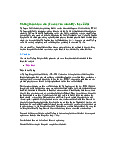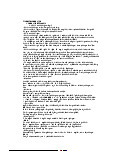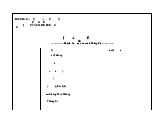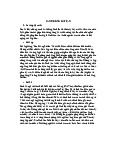


Preview text:
Summary
George Washington George Washington - hero of the Revolutionary War and America's first president,
twice elected unanimously by the Electoral College. He steered America on a course of neutrality, and
stepped down after two terms. John Adams John Adams - lawyer, diplomat and intellectual, he'd been
one of the leading voices in the call for American independence. He avoided all-out war with France, was
the first President to live in the White House, and the first to lose an election. Thomas Jefferson Thomas
Jefferson – chief author of the Declaration of Independence. He was a fierce defender of individual
liberty, though like several early Presidents, himself owned slaves. He opposed Federalism and strong
central government, but doubled America's size by buying 800,000 square miles of territory from France.
James Madison James Madison – at 5 foot 4, America's shortest President, but a towering figure in the
fight to pass the US Constitution and Bill of Rights. As President, he was forced to fight another war
against Great Britain, to uphold America's rights at sea. James Monroe James Monroe – the last
President who was also a Founding Father. He warned Europe not to meddle in American affairs, while
promising the US would not interfere in Europe's affairs. He passed legislation to restrict slavery to
existing slave-states, and new territories south of the Missouri Compromise line. He also supported the
colonisation of Liberia by free African-Americans, which is why its capital, Monrovia, is named after him.
John Quincy Adams John Quincy Adams – son of John Adams, America's second President. A brilliant
diplomat who prioritised economic development, while paying off most of America's national debt.
Andrew Jackson Andrew Jackson – a no-nonsense soldier, hero of the War of 1812, and founder of the
Democratic Party. Once wounded in a duel, his authoritarian style caused his opponents, the Whigs, to
brand him a dictator. He began a policy of forced relocation of Native American tribes to west of the
Mississippi River. Martin Van Buren – the first President born in an independent United States. Son of an
Martin Van Buren innkeeper, he spoke Dutch at home. His presidency was dominated by America's first
major financial crash. He served one term, then lost three subsequent bids for re-election. William Henry
Harrison William Henry Harrison – a soldier who spent most of his career fighting Native Americans. He
gave the longest inaugural speech in history, but served the shortest time in office – 30 days after his
speech he died of pneumonia - the first President to die in office. John Tyler John Tyler – the first Vice
President to become President following the death of his predecessor. Expelled from his own party, the
Whigs, for vetoing their bills, which he believed to contravene states' rights. James K Polk James K Polk –
a firm believer in westward expansion, he signed the law admitting Texas to the Union, and provoked a
war with Mexico, resulting in the acquisition of half a million square miles of North America, including
California, Nevada and Utah. He also negotiated the division of Oregon with the British. Zachary Taylor
Zachary Taylor – career soldier, hero of the Mexican War, had never voted before and held no firm
political beliefs. With tensions rising between slave-owning and free states, he threatened to hang
Southern secessionists, but died suddenly of a stomach illness. Millard Fillmore Millard Fillmore – born in
a log cabin, the last Whig President. He supported an uneasy compromise between free and slave states,
which was to prove short-lived. Franklin Pierce Franklin Pierce – took office shortly after he and his wife
witnessed the violent death of their 11 year old son, a trauma that likely left them both suffering from
depression. He hastened the slide towards civil war by allowing brutal violence to engulf Kansas, where
pro and anti-slavery settlers fought for control of the territory. James Buchanan, James Buchanan – his
attempts to mediate between Northern free states and Southern slave states failed abjectly, leading the
Democrat Party to split, and the Southern states to leave the Union. Abraham Lincoln Abraham Lincoln –
America's first Republican president, he led the North to victory in the Civil War, and freed all southern
slaves by executive order. He was the first president to be assassinated, shot and killed by John Wilkes
Booth, at Ford's Theatre in Washington Andrew Johnson DC. Andrew Johnson – a Southerner born into
poverty, he sided with the Union during the Civil War. But after the war, he blocked Congress's attempts
to impose reforms on the south. This led to his impeachment, though he was acquitted in the Senate by
one vote. Ulysses S Grant Ulysses S Grant – Union hero of the Civil War, he used the military to enforce
reconstruction of former slave states, and protect those targeted by white supremacist violence in the
south. His presidency also saw war against Native Americans, in the Great Plains. Rutherford B Hayes –
won the most disputed, corrupt and violent presidential election Rutherford V Hayes in US history. He
sought to heal the wounds left by the Civil War and Reconstruction, but by withdrawing federal troops
from the south, allowed white supremacists to regain power. James Garfield James A Garfield – took on
corruption in the Senate and civil service, with some success, but was shot by an embittered lawyer just
four months into his first term, and died of his wounds. Chester Arthur, Chester Arthur – son of an Irish
Baptist preacher. Against expectation, he proved above political faction, and continued Garfield's work of
reforming government bureaucracy. Grover Cleveland, Grover Cleveland – the first Democrat President
since the Civil War, and the only president to serve two non-consecutive terms. He used the presidential
veto with gusto, blocking measures he thought were beyond the remit of federal government – even
pensions for civil war veterans, and subsidies for destitute farmers. Look out for Part 2 of US Presidents,
where we continue with America's 23rd President. Bridgeman Images are the leading supplier of art,
culture and historic images and footage. Representing many of the world's finest museums, collections
and artists, their experts are ready to help with research and copyright, for projects ranging from TV and
film to publishing and advertising. For more information please visit bridgemanimages.com Epic History
TV relies on support from our viewers to keep making history videos. If you like what we do, please
consider making a small pledge at our Patreon page. Benjamin Harrison – the grandson of 9th President
William Henry Harrison.His presidency saw federal peacetime spending pass one billion dollars for the
first time. He also passed laws to ensure fairer competition in business. Grover Cleveland - his second
term was overshadowed by economic depression. The President offered little federal assistance, and
sent in troops to break a strike by the American Railway Union. William McKinley William McKinley –
raised import tariffs to unprecedented heights to protect US industry, and waged war against Spain over
Cuban independence. As a result, America gained the Philippines, Guam and Puerto Rico. Shortly into his
second term he was assassinated by a Polish-American anarchist, Leo Czolgosz. Theodore Roosevelt – at
42, the youngest ever President. As vigorous and energetic in office as he was in life, he broke up
business monopolies, asserted US power abroad, ensured completion of the Panama Canal, passed laws
to protect national forests and parks, and won a Nobel Peace Prize for brokering a truce between Russia
and Japan. William Howard Taft, William Howard Taft – a distinguished judge but not a natural politician,
he achieved many reforms, but alienated progressive Republicans including his former friend and ally
Theodore Roosevelt, who went off to form the 'Bull Moose Party': the Republican split handed the 1912
election to the Democrats. Taft later became Chief Justice of the United States. Woodrow Wilson – a
former professor of political science, and the first southern President since the Civil War. He passed
progressive reforms at home, and after numerous German provocations, led America into World War
One. His vision for a new world order, with America playing a full part as a member of the new League of
Nations, was blocked by a Republican Senate. Warren G Harding Warren G Harding – he sought to
rollback Wilson''s wartime measures, but following his sudden death from natural causes, revelations
emerged of extramarital affairs and cabinet corruption that destroyed his reputation. Calvin Coolidge
Calvin Coolidge – the son of a village storekeeper, moral conservative and man of famously few words.
He also believed in minimal federal intervention, and is still held up as a role model by fans of small
government. Herbert Hoover – raised a Quaker, he was a successful engineer, humanitarian, and
Secretary of Commerce. But his presidency was overshadowed by the Great Depression. Attempts to
revive the economy included spending on major public works, but to little effect. Franklin D Roosevelt
Franklin D Roosevelt – fifth cousin of Theodore Roosevelt, diagnosed with polio aged 39. His package of
economic measures helped lift America out of the Great Depression, while also improving federal
treatment of Native Americans. Winning an unprecedented four elections, he led America to the verge
of victory in World War Two, dying in office just 3 weeks before Germany's surrender. Harry S Truman
Harry S Truman – seeking a swift end to the Pacific War, he authorised the dropping of two atomic
bombs on Japan. At home, he passed progressive welfare and employment reform, and prioritised civil
rights. Abroad, he provided international leadership as the West entered a Cold War with the Soviet
Union. Dwight D Eisenhower Dwight D Eisenhower – supreme Allied commander in Europe in World War
Two, he was approached by both parties to run for president. He was the first to be limited to two terms
by a new constitutional amendment. He sought to contain the Soviet Union and de-escalate the Cold
War, and oversaw a period of great American prosperity, that included the construction of the US
Interstate Highway System. John F Kennedy John F Kennedy – the first Catholic president, and at 43, the
youngest elected to office. He sought to instil America with renewed idealism, made some progress over
civil rights in the south, and narrowly avoided nuclear war during the Cuban Missile Crisis. He was
assassinated in Dallas, Texas by Lee Harvey Oswald. Lyndon B Johnson – he enacted a wide-ranging
package of reforms to address racial injustice and poverty. But frustration at the speed of progress was
reflected by race riots in America's cities. Overseas, he continued to escalate US involvement in Vietnam
Richard Nixon Richard Nixon – withdrew US troops from Vietnam, and reduced tension with the Soviet
Union and China. He became the first president to resign his office, to avoid impeachment for his role in
the Watergate scandal. Gerald Ford, Gerald Ford – granted Nixon a presidential pardon, then struggled
with inflation and economic recession at home, while furthering detente with the Soviet Union. Jimmy
Carter Jimmy Carter – he struggled with an energy supply crisis, inflation and unemployment. Raised a
Baptist, he championed human rights abroad, brokered peace between Egypt and Israel,and negotiated
a treaty giving control of the Panama Canal to Panama, but his popularity was greatly damaged by the
Iran Hostage Crisis. Ronald Reagan Ronald Reagan – former Hollywood actor, and at 69 the oldest elected
President. His tax cuts and free-market reforms were credited with revitalising the US economy. He
launched America's 'War on Drugs', began an arms race with the Soviet Union, which he described as
'the evil empire', and supported anti-Communist insurgencies around the world George Bush George
Bush – a decorated World War Two navy pilot, later Director of the CIA. He oversaw America's response
to the collapse of the Soviet Union, and sent American troops to liberate Kuwait during the First Gulf War
Bill Clinton Bill Clinton – his presidency saw a period of peace and prosperity, low unemployment and
falling crime. He became the second President to be impeached, following the Monica Lewinsky scandal,
but was found not guilty by the Senate. George W Bush George W Bush – son of George Bush, his
presidency was shaped by the 9/11 terrorist attacks on New York and Washington. America's subsequent
'war on terror' led the US to become embroiled in long, costly operations in Iraq and Afghanistan. Barack
Obama Barack Obama – the first African-American president, he passed an economic stimulus package
to soften the impact of the 2008 financial crash, and an Affordable Care Act to improve access to medical
insurance. American forces continued to have a presence in Afghanistan and Iraq, where they helped to
tackle the new threat of ISIS. Now, all 44 US Presidents, according to their ranking in the Siena Research Institute survey




